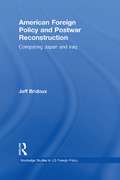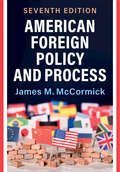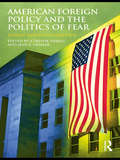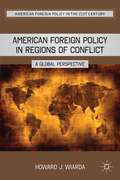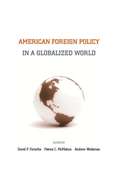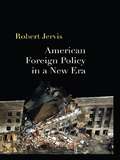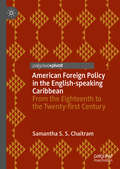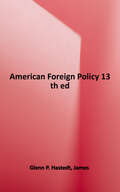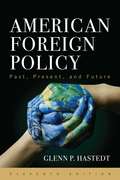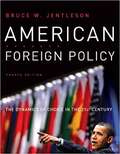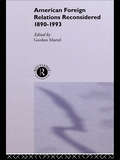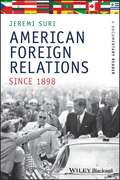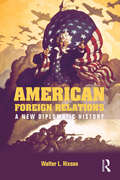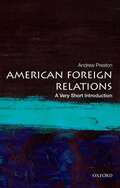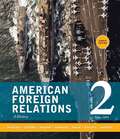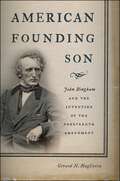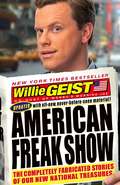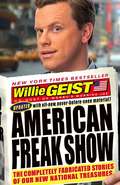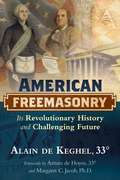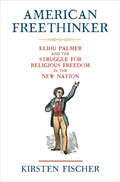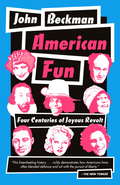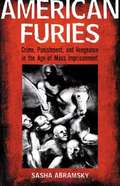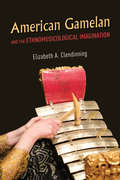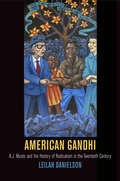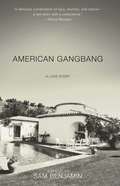- Table View
- List View
American Foreign Policy and Postwar Reconstruction: Comparing Japan and Iraq (Routledge Studies in US Foreign Policy)
by Jeff BridouxOn the eve of the invasion of Iraq, President G.W. Bush argued that if setting up democracy in Japan and Germany after WW II was successful, then it should also be successful in Iraq. This book provides a detailed comparison of the reconstruction of Japan from 1945 to 1952 with the current reconstruction of Iraq, evaluating the key factors affecting the success or failure of such projects. The book seeks to understand why American officials believed that extensive social reengineering aiming at seeding democracy and economic development is replicable, through identifying factors explaining the outcome of U.S.-led post-conflict reconstruction projects. The analysis reveals that in addition to the effective use of material resources of power, the outcome of reconstruction projects depends on a variety of other intertwined factors, and Bridoux provides a new analytical framework relying on a Gramscian concept of power to develop a greater understanding of these factors, and the ultimate success or failure of these reconstruction projects. Appraising the effectiveness of American power in the contemporary international structure, this work is a significant contribution to the field and will be of great interest to all scholars of foreign policy, international relations and conflict studies.
American Foreign Policy and The Politics of Fear: Threat Inflation since 9/11 (Routledge Global Security Studies)
by A. Trevor Thrall Jane K. CramerThis edited volume addresses the issue of threat inflation in American foreign policy and domestic politics. The Bush administration's aggressive campaign to build public support for an invasion of Iraq reheated fears about the president's ability to manipulate the public, and many charged the administration with 'threat inflation', duping the news media and misleading the public into supporting the war under false pretences. Presenting the latest research, these essays seek to answer the question of why threat inflation occurs and when it will be successful. Simply defined, it is the effort by elites to create concern for a threat that goes beyond the scope and urgency that disinterested analysis would justify. More broadly, the process concerns how elites view threats, the political uses of threat inflation, the politics of threat framing among competing elites, and how the public interprets and perceives threats via the news media. The war with Iraq gets special attention in this volume, along with the 'War on Terror'. Although many believe that the Bush administration successfully inflated the Iraq threat, there is not a neat consensus about why this was successful. Through both theoretical contributions and case studies, this book showcases the four major explanations of threat inflation -- realism, domestic politics, psychology, and constructivism -- and makes them confront one another directly. The result is a richer appreciation of this important dynamic in US politics and foreign policy, present and future. This book will be of much interests to students of US foreign and national security policy, international security, strategic studies and IR in general. Trevor Thrall is Assistant Professor of Political Science and directs the Master of Public Policy program at the University of Michigan - Dearborn. Jane Kellett Cramer is an Assistant Professor of Political Science at the University of Oregon.
American Foreign Policy in Regions of Conflict
by Howard J. WiardaAmerica's regional foreign policy priorities are shifting, toward Asia, the Middle East, Latin America, and Africa, and away from Europe and Russia. Wiarda examines these changes and the reasons for them in each of these regional areas in this comprehensive work on global perspective on American foreign policy. Designed as a text for introductory international relations, foreign policy, comparative politics, and world politics courses, this book succeeds in integrating these often separate subfields and shows how the study of comparative politics can enlighten foreign policy.
American Foreign Policy in a Globalized World
by David P. Forsythe Andrew Wedeman Patrice C. MacMahonIn this volume, several leading foreign policy and international relations experts consider the long term prospects and implications of US foreign policy as it has been shaped and practiced during the presidency of George W. Bush. The essays in this collection - based on the research of well-respected scholars such as Ole Holsti, Loch Johnson, John Ruggie, Jack Donnelly, Robert Leiber, Karen Mingst, and Edward Luck - offer a clear assessment: while US resources are substantial, Washington's ability to shape outcomes in the world is challenged by its expansive foreign policy goals, its exceptionalist approach to international relations, serious questions about the limits of its hard power resources as well as fundamental changes in the global system. Illustrating one of the central ironies of the contemporary situation in foreign affairs and international relations: that at the very time of the ‘unipolar moment,’ the world has become globalized to such an extent that the unilateralism of the Bush Administration leads as much to resistance as it does to coercion, compliance, and cooperation. American Foreign Policy in a Globalized World will be of interest to students and scholars of politics and international relations.
American Foreign Policy in a New Era
by Robert JervisTo say that the world changed drastically on 9/11 has become a truism and even a cliché. But the incontestable fact is that a new era for both the world and US foreign policy began on that infamous day and the ramifications for international politics have been monumental.In this book, one of the leading thinkers in international relations, Robert Jervis, provides us with several snapshots of world politics over the past few years. Jervis brings his acute analysis of international politics to bear on several recent developments that have transformed international politics and American foreign policy including the War on Terrorism; the Bush Doctrine and its policies of preventive war and unilateral action; and the promotion of democracy in the Middle East (including the Iraq War) and around the world. Taken together, Jervis argues, these policies constitute a blueprint for American hegemony, if not American empire. All of these events and policies have taken place against a backdrop equally important, but less frequently discussed: the fact that most developed nations, states that have been bitter rivals, now constitute a "security community" within which war is unthinkable.American Foreign Policy in a New Era is a must read for anyone interested in understanding the policies and events that have shaped and are shaping US foreign policy in a rapidly changing and still very dangerous world.
American Foreign Policy in the English-speaking Caribbean: From the Eighteenth to the Twenty-first Century
by Samantha S. ChaitramThis book traces American engagement in the English-speaking Caribbean from the eighteenth to the twenty-first century, and is the first to examine the policies of Presidents George W. Bush, Barack Obama and Donald Trump in this context. Focusing on The Bahamas, Jamaica, Trinidad and Tobago and Guyana as case studies, the book describes the growth of the English-speaking Caribbean and highlights American interest and foreign relations in this region from European discovery up through the post-9/11 era to today (1492-2019). The book demonstrates the unique relationship between America and the former British colonies, shedding light on U.S. foreign policy with the Caribbean in general and at a bilateral level with the four selected countries, providing a useful survey for students, scholars, diplomats, policymakers, governments officials, and anyone interested in gaining a better understanding of U.S. – Caribbean relations.
American Foreign Policy: Past, Present, and Future
by Glenn P. HastedtWorld affairs are constantly in flux, so students need to be prepared not just to know what’s happening in the headlines but how to make sense of those events. Hastedt’s American Foreign Policy helps students develop the critical thinking skills needed to participate in debates about foreign relations―today and throughout their lives. Rather than focus on normative questions about what direction the country should take on the world stage, this text is designed to provide the historical and institutional context for the foreign policy process, from the governmental and civil society actors involved to the issues that comprise the conduct and content of American foreign policy. <p><p>This thirteenth edition comes at a time when Biden’s presidency is facing some of the most important foreign policy questions in a generation, from the U.S. withdrawal from Afghanistan to what we should do about the Russian invasion of Ukraine. These issues have emerged as many of the traditional foundations in American foreign policy have been disrupted during the Trump administration, pleasing some and angering others but almost uniformly raising political tensions at home and abroad. The revision includes up-to-date coverage of the war in Ukraine, the U.S. exit from Afghanistan, health diplomacy and the response to COVID, the resurgence of great power politics, and other features of the Biden administration’s foreign policy.
American Foreign Policy: Past, Present, and Future (Eleventh Edition)
by Glenn P. HastedtGlenn Hastedt’s clear and succinct introduction to the field prepares students to think about America’s changing role in the world and to develop the critical thinking skills needed to participate in the debate about the conduct and content of American foreign policy. He begins by asking “What do we mean by foreign policy and what is the national interest?” Next, Hastedt looks to the past and examines the defining experiences that have helped to shape American foreign policy today. Third, he looks at how American foreign policy is made in the current hyperpartisan political climate. Here Hastedt examines the various institutions and how they come together to make policy, as well as the policy instruments available to decision makers. And finally, he encourages students to wonder, “What’s next?” <p><p> The eleventh edition reflects the latest headlines, including more extensive discussions of hybrid warfare, cyber wars, drones, and an assessment of Obama’s foreign policy. There are new case studies on ISIS, authorization of force resolutions, women in combat, the climate agreement, the Iran nuclear agreement, Obama’s opening to Cuba, and the future of COIN. And new Historical Lessons boxes feature the War Powers Act, the integration of the military, the Kyoto Agreement, NAFTA, and Afghanistan.
American Foreign Policy: The Dynamics Of Choice In The 21st Century
by Bruce W. JentlesonA crystal-clear, engaging introduction to U.S. foreign policy by one of the leading scholars in the field. Addressing both foreign policy strategy and foreign policy politics, Bruce Jentleson―respected scholar, award-winning teacher, and foreign policy practitioner―offers students the theoretical framework, historical context, and policy analysis essential for understanding American foreign policy in the twenty-first century. Professor Jentleson focuses on foreign policy strategy and foreign policy politics and employs a four-part framework (the four Ps: Power, Peace, Prosperity, and Principles) through which students can begin to appreciate the problems and choices faced by the United States as it tries to steer a course through world events. The Fourth Edition of American Foreign Policy has been thoroughly updated with relevant political developments, including foreign policy changes instituted by the Obama administration.
American Foreign Relations Reconsidered: 1890-1993
by Gordon MartelThis major new textbook brings together twelve of the leading scholars of U.S. foreign relations. Each contributor provides a clear, concise summary of an important period or theme in US diplomatic and strategic affairs since the Spanish-American War. Michael Hunt and Joan Hoff provide an overview of the traditions behind US policy and a preview of things to come. Together, the contributors offer a succinct explanation of the controversies and questions that historians have grappled with throughout the twentieth century. Students will find these essays a reliable and useful guide to the various schools of thought which have emerged. Although each of the scholars is well known for their detailed and original work, these essays are new and have been specially commissioned for this book. The articles follow the chronological development of the emergence of the United States as a world power, but special themes such as the American policy process, economic interests, relations with the Third World, and the dynamics of the nuclear arms race have been singled out for separate treatment. American Foreign Relations Reconsidered, 1890-1993 represents essential reading for upper level undergraduates studying modern American history. The book has been designed and written exclusively to meet the needs of students, either as a major course text, or as a set of supplementary readings to support other texts.
American Foreign Relations Since 1898 (Uncovering The Past: Documentary Readers In American History)
by Jeremi SuriThis volume brings together more than 50 documents which examine foreign policy not only in terms of leaders and states, but also through social movements, cultures, ideas, and images, to provide comprehensive understanding of how Americans have interacted with the wider world since 1898. <p><p> Draws together over 50 primary documents to give readers a first-hand account of the people and events that shaped the foreign policy of the United States <p> Incorporates documents relating not only to leaders and states, but also to social movements, cultures, ideas, and images <p> Highlights the diverse range of contributors to debates about American foreign policy, from presidents to protesters, students to singers <p> Includes a comprehensive introduction to the subject and headnotes for each document written by the editor, as well as a bibliography for further study
American Foreign Relations: A New Diplomatic History
by Walter L. HixsonAmerican Foreign Relations: A New Diplomatic History is a compelling narrative history of American foreign policy from the early settlement of North America to the present. In addition to economic and strategic motives, Walter L. Hixson integrates key cultural factors--including race, gender, and religion--into the story of American foreign policy. He demonstrates how these factors played a vital role in shaping the actions of the United States in world affairs. Beginning with the history of warfare and diplomacy between indigenous peoples and Europeans before the establishment of the United States, this book shows the formative influence of settler colonialism on the country's later foreign policy and the growth of American empire. Clearly written and comprehensive, the book features: Extensive illustrations, with over 100 images and maps Primary documents in each chapter, showcasing the perspectives of historical actors "Interpreting the Past" features that explore how historians' understanding of events has changed over time Selected bibliographies of key resources for further research in each chapter In one concise volume, American Foreign Relations covers the full sweep of American foreign policy from the colonial period to the present day. It is an essential introduction for anyone seeking to understand the history of America's role in the world.
American Foreign Relations: A Very Short Introduction (Very Short Introductions Ser.)
by Andrew PrestonFor better or worse--be it militarily, politically, economically, technologically, or culturally--Americans have had a profound role in shaping the wider world beyond them. The United States has been a savior to some, a curse to others, but either way such views are often based on a caricature of American actions and intentions. American Foreign Relations, then, is a subject of immense global importance that provokes strong emotions and much debate, but often based on deep misunderstanding. This Very Short Introduction analyzes the key episodes, themes, and individuals in the history of American foreign relations. While discussing diplomacy and the periods of war that have shaped national and international history, it also addresses such topics as industrialization, globalization, imperialism, and immigration. Covering the Revolution through the War on Terror, it examines the connections between domestic politics and foreign affairs, as well as the importance of ideals and values. Sharply written and highly readable, American Foreign Relations offers a clear-eyed narrative of America's role in the world and how it has evolved over time.
American Foreign Relations: Volume 2: Since 1895
by Brigham Thomas Paterson Michael Donoqhue Kenneth Hagan J. Garry CliffordThis best-selling text presents the best synthesis of current scholarship available to emphasize the theme of expansionism and its manifestations.
American Founding Son: John Bingham and the Invention of the Fourteenth Amendment
by Gerard N. MaglioccaA history of the origins of the 14th Amendment and the the man who helped craft itJohn Bingham was the architect of the rebirth of the United States following the Civil War. A leading antislavery lawyer and congressman from Ohio, Bingham wrote the most important part of the Fourteenth Amendment to the Constitution, which guarantees fundamental rights and equality to all Americans. He was also at the center of two of the greatest trials in history, giving the closing argument in the military prosecution of John Wilkes Booth’s co-conspirators for the assassination of Abraham Lincoln and in the impeachment of President Andrew Johnson. And more than any other man, Bingham played the key role in shaping the Union’s policy towards the occupied ex-Confederate States, with consequences that still haunt our politics.American Founding Son provides the most complete portrait yet of this remarkable statesman. Drawing on his personal letters and speeches, the book traces Bingham’s life from his humble roots in Pennsylvania through his career as a leader of the Republican Party. Gerard N. Magliocca argues that Bingham and his congressional colleagues transformed the Constitution that the Founding Fathers created, and did so with the same ingenuity that their forbears used to create a more perfect union in the 1780s. In this book, Magliocca restores Bingham to his rightful place as one of our great leaders.
American Freak Show
by Willie GeistThis is not the first book written about quantum mechanics, but it just might be the last. The theory presented inside these pages is so revolutionary that it has stunned the scientific community into reconsidering centuries of thought about the behavior of energy and matter. Prepare to have your mind blown. Sorry, that's the introduction to Willie Geist's next book--the culmination of his life's work. Look for it next spring, just in time for Mother's Day. This book is about his other passion: freaks. When he's not in the lab, Geist spends his time on MSNBC's Morning Joe sifting through the wreckage of American politics and popular culture. These days, that's a big job. With an Alaska hockey mom turning, almost overnight, into a national icon and threatening to move from Wasilla to the White House, with the world's most famous athlete now associated less with the Masters and more with the strippers, and with reality TV working around the clock to ensure the constitutional right of every man, woman, and child to fifteen minutes of fame, Geist's business is thriving. In his hilarious first book, American Freak Show, Geist takes the smart, biting observation loved by his television audience to new satirical extremes. The real-life characters who now haunt our daily lives are cast as stars in completely made-up scenes that, frankly, are not all that far from reality. Geist treats us to the first look at President Sarah Palin's unconventional inaugural address, performed live on WWE's Monday Night Raw after her renegade victory in the 2012 election. We go inside the ballroom for a Dean Martin-style welcome roast of Bernie Madoff upon his arrival in Hell, with Pol Pot serving as sidesplitting roastmaster. Geist provides us with never-before-seen FBI wiretap transcripts of the more mundane, but equally profane, telephone conversations of former Illinois governor Rod Blagojevich. And George W. Bush's batting-cage-and-waterslide-themed plans for a presidential library are laid out publicly for the first time. From Obama to Oprah, Afghanistan to Lohan, and Snooki to the Salahis, Willie Geist spares no one as our host of this wild American Freak Show. You'll laugh out loud while weeping for the future of America.
American Freak Show: The Completely Fabricated Stories of Our New National Treasures
by Willie GeistThis is not the first book written about quantum mechanics, but it just might be the last. The theory presented inside these pages is so revolutionary that it has stunned the scientific community into reconsidering centuries of thought about the behavior of energy and matter. Prepare to have your mind blown. Sorry, that's the introduction to Willie Geist's next book--the culmination of his life's work. Look for it next spring, just in time for Mother's Day. This book is about his other passion: freaks. When he's not in the lab, Geist spends his time on MSNBC's Morning Joe sifting through the wreckage of American politics and popular culture. These days, that's a big job. With an Alaska hockey mom turning, almost overnight, into a national icon and threatening to move from Wasilla to the White House, with the world's most famous athlete now associated less with the Masters and more with the strippers, and with reality TV working around the clock to ensure the constitutional right of every man, woman, and child to fifteen minutes of fame, Geist's business is thriving. In his hilarious first book, American Freak Show, Geist takes the smart, biting observation loved by his television audience to new satirical extremes. The real-life characters who now haunt our daily lives are cast as stars in completely made-up scenes that, frankly, are not all that far from reality. Geist treats us to the first look at President Sarah Palin's unconventional inaugural address, performed live on WWE's Monday Night Raw after her renegade victory in the 2012 election. We go inside the ballroom for a Dean Martin-style welcome roast of Bernie Madoff upon his arrival in Hell, with Pol Pot serving as sidesplitting roastmaster. Geist provides us with never-before-seen FBI wiretap transcripts of the more mundane, but equally profane, telephone conversations of former Illinois governor Rod Blagojevich. And George W. Bush's batting-cage-and-waterslide-themed plans for a presidential library are laid out publicly for the first time. From Obama to Oprah, Afghanistan to Lohan, and Snooki to the Salahis, Willie Geist spares no one as our host of this wild American Freak Show. You'll laugh out loud while weeping for the future of America.
American Freemasonry: Its Revolutionary History and Challenging Future
by Margaret C. Jacob Alain De Keghel Arturo De HoyosExplores the American Masonic system and its strengths and failings • Examines the history of Freemasonry in the United States from the colonial era and the Revolutionary War to the rise of the Scottish branch onward • Investigates the racial split in American Freemasonry between black lodges and white and how, unlike French lodges, women are ineligible to become Masons in the U.S. • Reveals the factors that have resulted in shrinking Masonic enrollment in America and explores the revitalization work done by the Grand Lodge of California Freemasonry bears the imprint of the society in which it exists, and Freemasonry in North America is no exception. While keeping close ties to French lodges until 1913, American Freemasonry was also deeply influenced by the experiences of many early American political leaders, leading to distinctive differences from European lodges. Offering an unobstructed view of the American system and its strengths and failings, Alain de Keghel, an elder of the Grand Orient de France and, since 1999, a lifetime member of the Scottish Rite Research Society (Southern U.S. jurisdiction), examines the history of Freemasonry in the United States from the colonial era to the Revolutionary War to the rise of the Scottish branch onward. He reveals the special relationship between the French Masonic hero, the Marquis de Lafayette, and the Founding Fathers, especially George Washington and Benjamin Franklin, including French Freemasonry’s role in the American Revolution. He also explores Franklin’s Masonic membership, including how he was Elder of the lodge of the Nine Sisters in Paris. The author investigates the racial split in American Freemasonry between black lodges and white and how, unlike French lodges, women are ineligible to become Masons in the U.S. He examines how American Freemasonry has remained deeply religious across the centuries and forbids discussion of religious or social issues in its lodges, unlike some branches of French Freemasonry, which removed belief in God as a prerequisite for membership in 1877 and whose lodges operate in some respects as philosophical debating societies. Revealing the factors that have resulted in shrinking Masonic enrollment in America, the author explores the revitalization work done by the Grand Lodge of California and sounds the call to make Freemasonry and its principles relevant to America once again.
American Freethinker: Elihu Palmer and the Struggle for Religious Freedom in the New Nation (Early American Studies)
by Kirsten FischerThe first comprehensive biography of Elihu Palmer tells the life story of a freethinker who was at the heart of the early United States' protracted contest over religious freedom and free speech.When the United States was new, a lapsed minister named Elihu Palmer shared with his fellow Americans the radical idea that virtue required no religious foundation. A better source for morality, he said, could be found in the natural world: the interconnected web of life that inspired compassion for all living things. Religions that deny these universal connections should be discarded, he insisted. For this, his Christian critics denounced him as a heretic whose ideas endangered the country.Although his publications and speaking tours made him one of the most infamous American freethinkers in his day, Elihu Palmer has been largely forgotten. No cache of his personal papers exists and his book has been long out of print. Yet his story merits telling, Kirsten Fischer argues, and not only for the dramatic account of a man who lost his eyesight before the age of thirty and still became a book author, newspaper editor, and itinerant public speaker. Even more intriguing is his encounter with a cosmology that envisioned the universe as interconnected, alive with sensation, and everywhere infused with a divine life force.Palmer's "heresy" tested the nation's recently proclaimed commitment to freedom of religion and of speech. In this he was not alone. Fischer reveals that Palmer engaged in person and in print with an array of freethinkers—some famous, others now obscure. The flourishing of diverse religious opinion struck some of his contemporaries as foundational to a healthy democracy while others believed that only a strong Christian faith could support democratic self-governance. This first comprehensive biography of Palmer draws on extensive archival research to tell the life story of a freethinker who was at the heart of the new nation's protracted contest over religious freedom and free speech—a debate that continues to resonate today.
American Fun
by John BeckmanHere is an animated and wonderfully engaging work of cultural history that lays out America's unruly past by describing the ways in which cutting loose has always been, and still is, an essential part of what it means to be an American. From the time the Pilgrims landed at Plymouth Rock, Americans have defied their stodgy rules and hierarchies with pranks, dances, stunts, and wild parties, shaping the national character in profound and lasting ways. In the nation's earlier eras, revelers flouted Puritans, Patriots pranked Redcoats, slaves lampooned masters, and forty-niners bucked the saddles of an increasingly uptight middle class. In the twentieth century, fun-loving Americans celebrated this heritage and pushed it even further: flappers "barney-mugged" in "petting pantries," Yippies showered the New York Stock Exchange with dollar bills, and B-boys invented hip-hop in a war zone in the Bronx. This is the surprising and revelatory history that John Beckman recounts in American Fun. Tying together captivating stories of Americans' "pursuit of happiness"--and distinguishing between real, risky fun and the bland amusements that paved the way for Hollywood, Disneyland, and Xbox--Beckman redefines American culture with a delightful and provocative thesis. (With black-and-white illustrations throughout.)From the Hardcover edition.
American Furies: Crime, Punishment and Vengeance in the Age of Mass Imprisonment
by Sasha Abramsky[Back cover] In this disturbing yet elegant expose of U.S. penitentiaries and their surrounding communities, Sasha Abramsky shows how American prisons have abandoned their long-held ideal of rehabilitation, often for political reasons. After surveying our current state of affairs--life sentences for nonviolent crimes, appalling conditions for inmates, the growth of private prisons, the treatment of juveniles--Abramsky argues that our punitive policies are not only inhuman but deeply counterproductive. Brilliantly researched and compellingly told, American Furies reveals the devastating consequences of a society that believes in "lock 'em up and throw away the key." 8:41 AM 12/22/2008
American Gamelan and the Ethnomusicological Imagination
by Elizabeth A. ClendinningGamelan and American academic institutions have maintained their close association for more than sixty years. Elizabeth A. Clendinning illuminates what it means to devote one’s life to world music ensemble education by examining the career and community surrounding the Balinese-American performer and teacher I Made Lasmawan. Weaving together stories of Indonesian and American practitioners, colleagues, and friends, Clendinning shows the impact of academic world music ensembles on the local and transnational communities devoted to education and the performing arts. While arguing for the importance of such ensembles, Clendinning also spotlights how performers and educators use them to create stable and rewarding artistic communities. Cross-cultural ensemble education emerges as a worthy goal for students and teachers alike, particularly at a time when people around the world express more enthusiasm about raising walls to keep others out rather than building bridges to invite them in.
American Gandhi
by Leilah DanielsonWhen Abraham Johannes Muste died in 1967, newspapers throughout the world referred to him as the "American Gandhi." Best known for his role in the labor movement of the 1930s and his leadership of the peace movement in the postwar era, Muste was one of the most charismatic figures of the American left in his time. Had he written the story of his life, it would also have been the story of social and political struggles in the United States during the twentieth century.In American Gandhi, Leilah Danielson establishes Muste's distinctive activism as the work of a prophet and a pragmatist. Muste warned that the revolutionary dogmatism of the Communist Party would prove a dead end, understood the moral significance of racial equality, argued early in the Cold War that American pacifists should not pick a side, and presaged the spiritual alienation of the New Left from the liberal establishment. At the same time, Muste was committed to grounding theory in practice and the individual in community. His open, pragmatic approach fostered some of the most creative and remarkable innovations in progressive thought and practice in the twentieth century, including the adaptation of Gandhian nonviolence for American concerns and conditions.A biography of Muste's evolving political and religious views, American Gandhi also charts the rise and fall of American progressivism over the course of the twentieth century and offers the possibility of its renewal in the twenty-first.
American Gangbang: A Love Story
by Sam BenjaminA thoughtful, hilarious, and compulsively readable memoir by an Ivy League graduate-turned-pornographer who sets out to bring sophistication and equality to sexual cinema--only to find that he can't change porn, but porn can certainly change him.American Gangbang heralds the arrival of a profound and gifted new voice in narrative nonfiction. In 1999, after four years of studying at Brown University, Sam Benjamin heads to California in a twenty-year-old Volvo, dead set on turning himself into an artist, despite his complete lack of talent. There, stoned, he has an epiphany--he will make progressive porn. And so begins his turbulent journey. . . .In whip-smart, lyrical prose, Benjamin traces his three-year immersion into the world of Hollywood's bleak, screen glow-lit doppelganger: the southern California sex industry. His rapid ascent from the dingy storefront rental of a starving artist to the multimillion-dollar Malibu villa of a full-fledged porn producer confronts him with the uncomfortably alluring realities of America's strangest industry: gun-toting actors, high on terrible, drug-induced potency; giggling actresses battling internal demons in wobbly heels and pink fishnets; the insatiable consumer demands to sink ever lower, more exploitative, nastier. The result is the titillating, dramatic chronicle of a young man who invites the deepest, most troubling parts of himself to rise to the surface in order to get a good look at them--only to find that what he sees makes his world seem suddenly very small.A provocative, universal coming-of-age story, American Gangbang explores with unflinching honesty the darkly rich junction of sex and self-discovery.
